Usan and Basagala are urban indigenous persons who returned to their indigenous villages to start their own business, and got married after dating for a year and half. Facing the completely different ideas of their respective peoples towards same-sex marriage , they listen and try to empathize, face the difficulties hand in hand with respect. Finally, their parents on both sides all attended their wedding, giving this wedding extra significance.
Approximately 1-hour drive south from downtown Taitung is the Paiwan indigenous village Jinlun, famous for its hot springs sitting along the South Link Highway. Usan and Basagala are receiving guests in the Bed & Breakfast Dagedan House they run together.
Married in May 2020, Usan and Basagala have a home of their own in a house in the village. Life after marriage is just like any other day, busy bustling between the B&B and Cafe. Occasionally, when they have the time, they will pass through the culvert nearby their business to reach the Jinlun Beach, and pile stones in front of the vast Pacific Ocean. Two men, one dog and one cat, their lives are peacefully sweet, serene and steady.
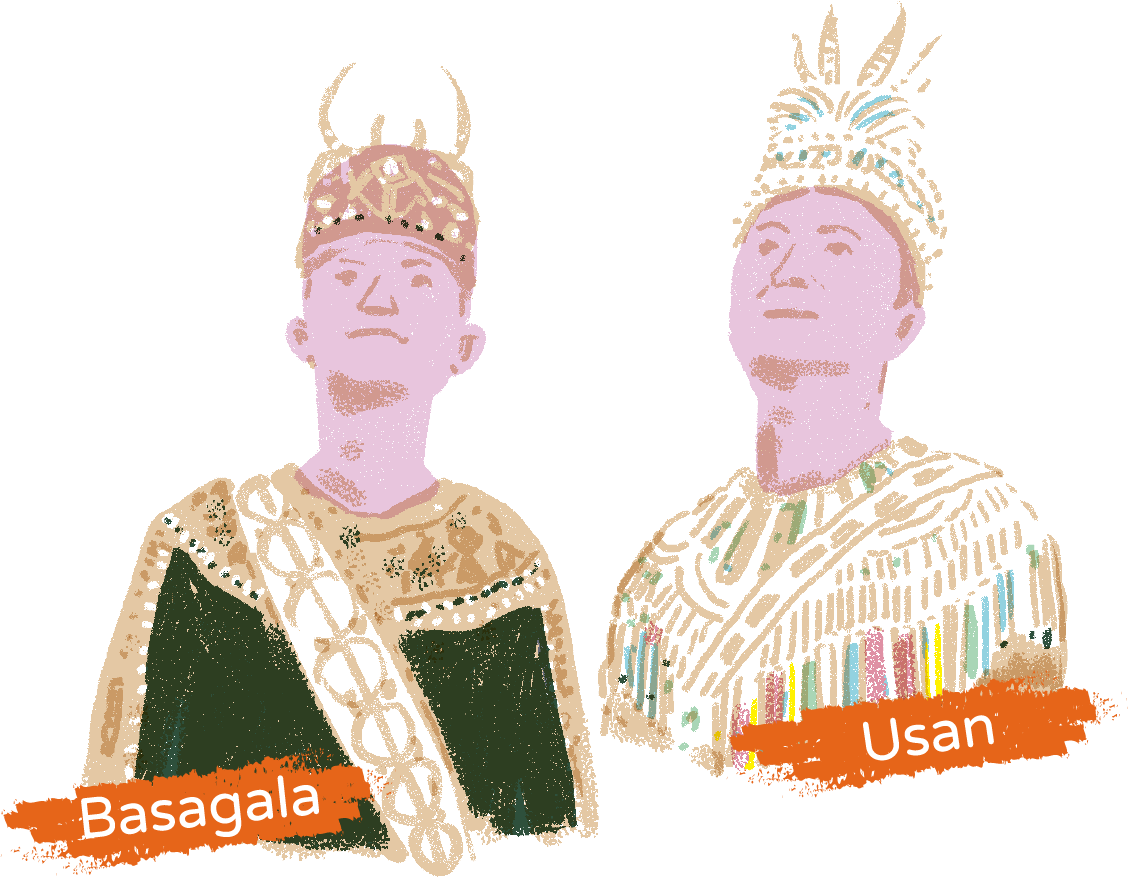
Urban Indigenous Move Back Home
Similar Backgrounds Bring Them Together
“I never thought I would be with an indigenous person!” The minute Usan finishes his sentence, Basagala chimes in, “me too!” Their eyes meet for a split second, and smile is all over their faces.
Usan has a Pangcah father and Paiwan mother, moved to Taichung with his parents during elementary school to receive better education, and stayed in Taipei in the hospitality service after he grew up. Six years ago during the harvest festival in his indigenous village, Usan suddenly realized that he has indigenous origin, yet he knows nothing about indigenous culture. Therefore, when his parents decided to move back home for retirement, Usan followed and started his Bed & Breakfast Dagedan House in Jinlun. In the past two years, he further opened LI.KA CAFE nearby the B&B to create more employment opportunities for young people in the village.
Basagala is Rukai, from the Taromak Village in Taitung. After he was discharged from the military, he returned to the village to help his parents farm naturally. He met Usan in the hospitality course he worked as part-time. 6 years apart in age, their paths never crossed before they met, but they had similar experiences growing up in the village, went to school and worked in urban areas before finally coming back to their indigenous villages. Congenial interactions between the two quickly brought them together, and after a year and half, seeing the adoption of the special law for same-sex marriage, they decided to get married.
“He's the type of person that wears a smile no matter what,” says Usan, feeling the never-ending joy when he is with Basagala. They have both had experiences of long-term relationships for over a decade, so they know exactly what kind of person they want to spend their lives with. Basagala also says that parents on both sides know about them, and that comfort and ease naturally prompted them to take the next step and enter a substantial marriage.
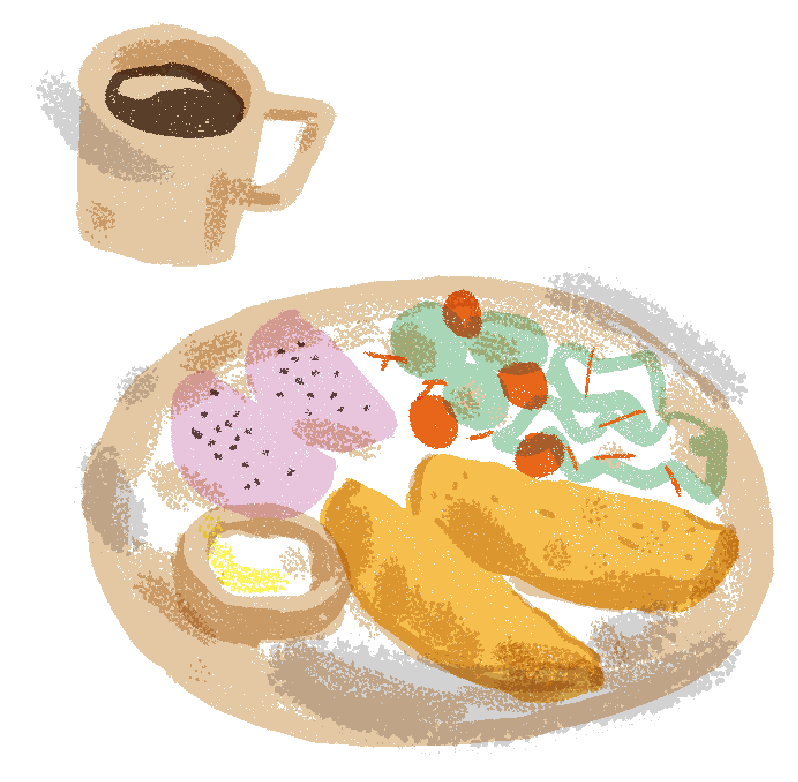
Listen to and Sympathize
with Elders
Whatever gender identity, marriage is ultimately about two families, and not just the couple. While discussing their wedding details, Basagala from a patrilineal society immediately encountered a tremendous obstacle. His mother never approved of same-sex marriage to begin with, elders his father's age piled on even more pressure, but the most difficult of all was his oldest brother who said blatantly, “you can be together all you want, but you can forget about getting married.” That made Basagala's mother even more worried that the wedding will tear the family apart.
The law may have given LGBTIQ the right to marriage, but people's beliefs and ideas are not about change overnight just because the law was adopted. “Why can you get married and I can't?” Basagala admits, he was frustrated as well. Having been born to a large family and close with everyone, he may be able to bravely be himself away from home, but deep down he wishes for the blessings of his original family.
When he was depressed, it was Usan and Usan's parents that gave him the courage to go on. Usan's Paiwan parents are more open to the idea of gender diversity, and they knew very early on the gender identity of their child, so when Usan told his mother about their plan to get married, his mother was far from surprised and even said, “that's fantastic, so should we pick a day and visit Basagala's parents?” When Usan's grandmother saw Basagala, she was overjoyed, touching his face and saying, “such a beautiful child!”
The carefree and easygoing attitude of Usan's family gave Basagala more courage to face the difficult situation in his family. Usan accompanied Basagala in delivering their wedding invitation to elders in the village and notifying them of the news, even when they encountered different opinions, he would bend down and listen to what they had to say. Some elders were unpleasantly surprised, while some voiced their sincere concern, Basagala discovered, when the two sides are no longer angry at each other, the elders are simply worried that they will be discriminated against in the future for their sexual identity, not just because they simply disapprove of it. Some family members and friends even approached them to give them blessing upon hearing of the news.
On the other hand, religion is usually why indigenous peoples are against same-sex marriage. In order to reassure their parents on both sides about the wedding, Usan even invited to Taitung the reverend of the Taipei Tong-Kwang Light House Presbyterian Church , and talk to them by quoting the Bible, emphasizing that everyone deserves blessings, and that they need not afraid that same-sex marriage is at odds with their faith. This gathering was very reassuring to Basagala's mother, even though she could not sincerely support same-sex marriage, she's willing to take the first step to attend and bless her child's wedding, out of her love for him.
“Be it support or opposition, I think it's very important that we hear them out quietly, and thank them.” Usan was very impressed with how Basagala was willing to set himself aside when facing the elders, and sensed just how determined Basagala is in marrying him.
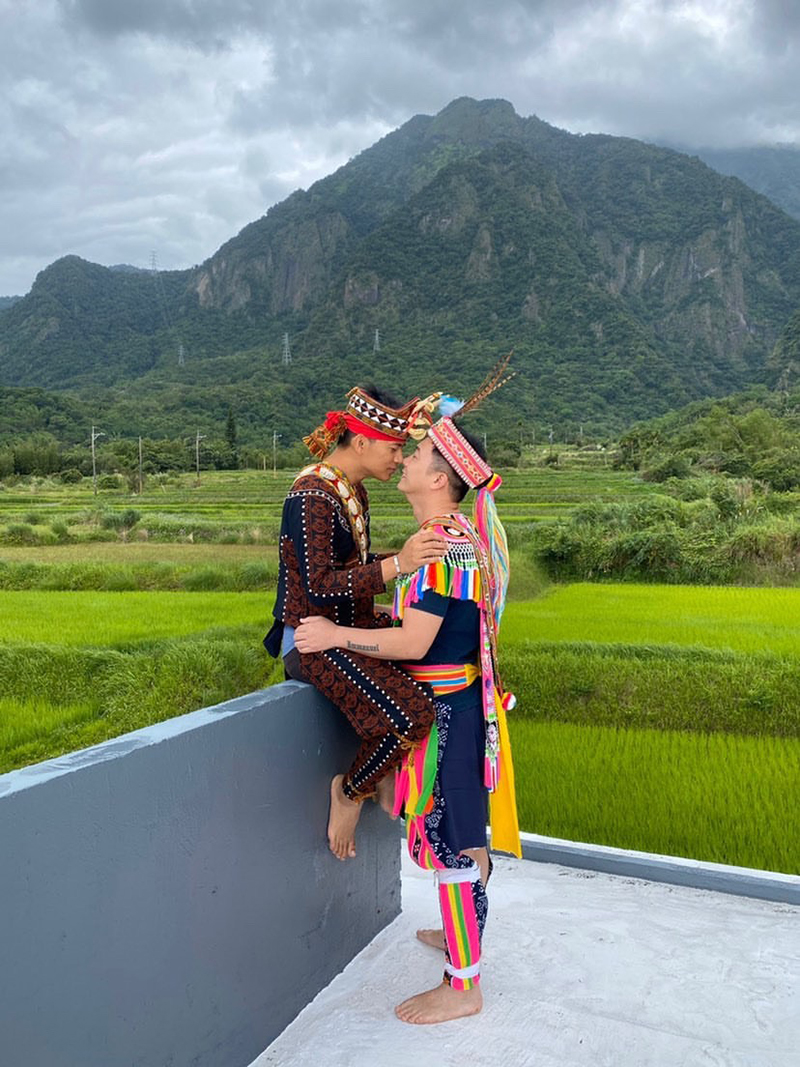
Parents from Both Side Present
Fulfilling the Perfect Indigenous LGBT Wedding
The couple chose May 20, 2020 as their wedding day, in addition to symbolizing “I love, love, love you”, it was a weekday, a perfect excuse for those who oppose same-sex marriage to not attend.
With both of them as indigenous persons, they insist that everyone attend the wedding in their indigenous clothing. Having learnt embroidery as a child, Basagala follows the Rukai tradition and spent months making traditional indigenous clothing for Usan. It's the first piece of hand-sewn indigenous clothing Usan has ever owned, having grown up in the city. Basagala further picked flowers and weed in the village, and braided the beautiful wreaths they both were going to wear, he says jokingly, “we're both short because we're going bare foot, so we need wreaths to add a little height.”
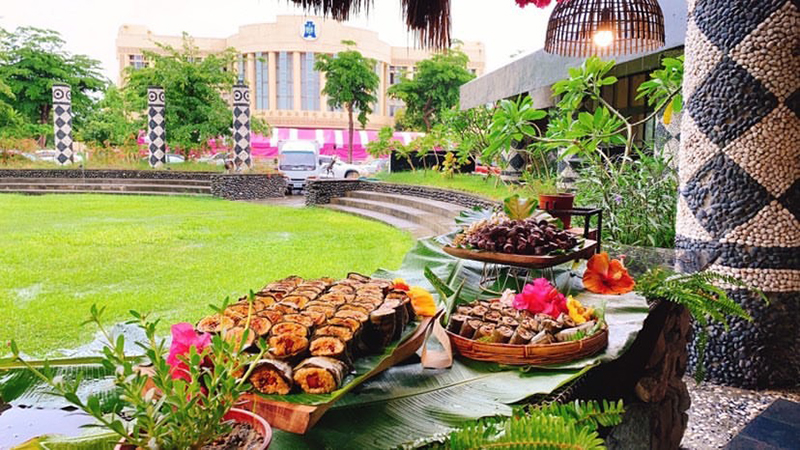
In order to help their sons' wedding fully deliver the indigenous spirits, the two mothers brought their homemade delicacy to share with the guests, the taro abay unique to the Rukai people and the sticky rice hahah of the Pangcah people. Many other indigenous friends also brought their homemade cooking to celebrate, turning the entire reception into a mini version of the Taitung Slow Food Festival. 70 guests were originally invited, but over 100 turned up, neither of them had anticipated that so many people could understand and support same-sex marriage, to the point of showing up in person to give them their blessings.
When they were giving their wedding speeches, Basagala voiced his gratitude towards his mother through the microphone, “I would especially like to thank my mother, who had to overcome tremendous pressure to stand here today and give me her blessing…” Before he could finish, Basagala hugged his mother on stage and both broke into tears, sending the audience all into tears as well.
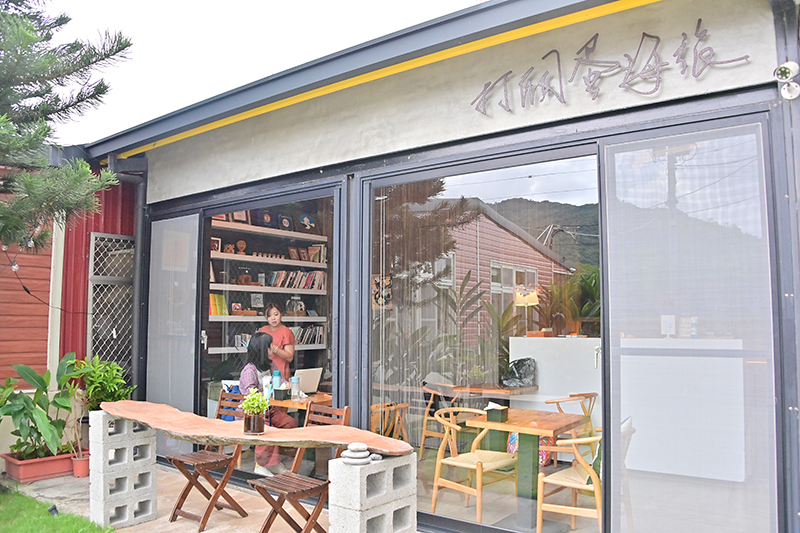
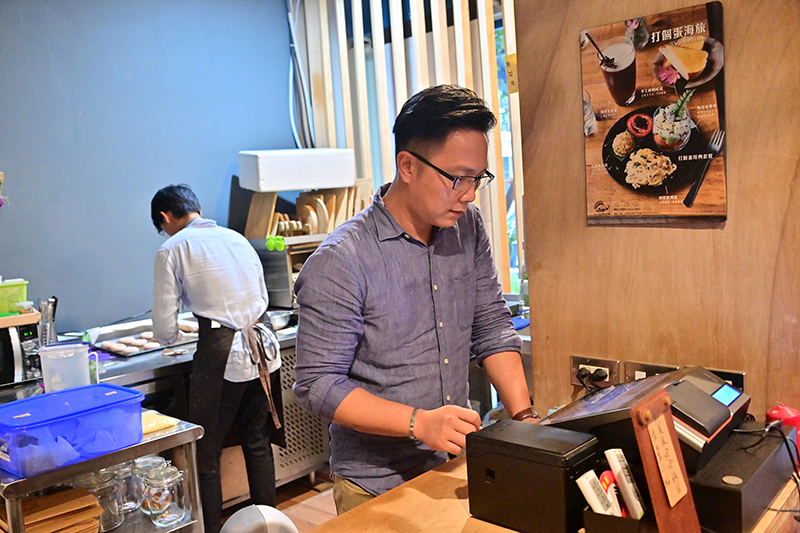
It Only Takes a Minute to Decide
to Bind or Resolve with Love
The reverend that married Usan and Basagala said that he has already married 26 couples since same-sex marriage was legalized, but this was the first wedding where both sides of the parents were present. It shows that even with the law legally adopted, many LGBT couples are still unable to get through to their parents.
After the wedding, neighbors that didn't used to greet them are now willing to give them their blessings. During family gatherings, not only can they attend hand in hand, but they can naturally introduce each other as “my husband.” The unspoken and complicated hurdles have gradually resolved and disappeared.
“I hope our story brings some positive energy to children who are wandering out there,” says Usan. Many people are afraid of and avoid their family because of their sexual identity, but the reason that family bond feels suffocating or restricting is because of love, it is necessary to take on the responsibility of marriage and to fully understand the attitude of the family members. After all, regardless of gender identity or ethnicity, marriage is never a fairy tale, but a test of the real life.





